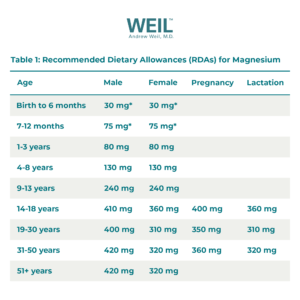Magnesium

What is magnesium?
Magnesium, the fourth most abundant mineral in the body, is one of the essential micronutrients. Unlike trace minerals, which are needed in only small amounts, the major minerals (magnesium, calcium, phosphorus, sulfur, sodium, chloride, and potassium) require 100 milligrams or more a day for good health. Found in bones, teeth, and red blood cells, magnesium is required for proper functioning of the nervous, muscular and cardiovascular systems.
Why is magnesium necessary?
Magnesium helps maintain muscles, nerves, and bones, and studies have shown that a diet rich in magnesium may help protect against metabolic syndrome, a combination of risk factors that can lead to diabetes, heart disease, and stroke. Magnesium is critical in the processes that produce energy, synthesize protein, and replicate DNA, and it also plays a role in regulating other minerals and vitamins, including calcium, copper, zinc, potassium, and vitamin D.
More than half of the magnesium in the body is found in bones. Daily intake is needed to maintain homeostasis in the body; magnesium consumed in food or supplements is put to work and excess is filtered out in urine. When not enough magnesium is supplied, the kidneys respond by excreting less in urine. In severe deficiencies the body may dip into the reservoir in the bones to meet its daily need.
What are the signs of a deficiency?
A deficiency in magnesium (called hypomagnesemia) can result in issues ranging from irritability and muscle weakness to irregular heartbeat. The earliest indicators of a deficiency include nonspecific symptoms that may not be immediately identified as being related to magnesium:
- Fatigue
- Loss of appetite
- Nausea and vomiting
- Muscle spasms
- Muscle weakness
If the magnesium deficiency is not corrected, more advanced signs and symptoms of severe hypomagnesemia may include:
- Numbness and tingling
- Convulsions/seizures
- Involuntary eye movements known as nystagmus
- Muscle contractions and cramps
- Personality changes
- Abnormal heart rhythms
- Coronary spasms
- Cardiac arrest
- Respiratory arrest
The long-term effects of magnesium deficiency are complex, and research is not yet definitive on the relationship between daily intake and cardiovascular disease, diabetes, and osteoporosis. There is, however, good evidence that sufficient magnesium intake decreases the development and effects of metabolic syndrome – a group of conditions including high blood pressure, high blood sugar, excess abdominal fat, and high cholesterol.
How much, and what kind, does an adult need?
According to the National institutes of Health (NIH), the recommended dietary allowances (RDAs) for men and teenage boys is 400-420 mg; adult women and teenage girls is 310-360 mg (higher for pregnant or breastfeeding women). A balanced diet usually supplies all the magnesium a person needs, but people with specific illnesses or who are taking certain medications may benefit from magnesium supplements. Dr. Weil recommends taking half as much magnesium as one does calcium, to ensure the appropriate balance of these two key minerals in the body and offset calcium’s constipating effects. Look for magnesium citrate, chelate, or glycinate, and avoid magnesium oxide, which can be irritating. See Table 1 for a breakdown of magnesium dietary allowances from NIH.

How much does a child need?
Infants need 30 mg a day of magnesium up until about six months of age, then 75-80 mg a day until age 3. From ages 4 to 8, children need 130 mg a day; from age 9 to 13 they need 240 mg a day. Adult requirements start at age 14.
How do you get enough magnesium from foods?
Good dietary sources of magnesium include whole grains; spinach and other leafy green vegetables; almonds, cashews, and other nuts; avocados; beans; whole soybeans; and halibut. (See Best Sources of Magnesium.) Be aware that a diet high in fat may cause less magnesium to be absorbed, and cooking may decrease the magnesium content of food.
If you need to increase your magnesium (if, for example, blood tests or urinalysis show evidence of a deficiency) you can take magnesium supplements. The best forms are magnesium citrate, chelate, or glycinate. Avoid magnesium oxide, which can be irritating and cause bloating, intestinal cramping, and diarrhea. There are also combination calcium-magnesium supplements that supply both of these important minerals.
Are there any risks associated with too much magnesium?
In otherwise healthy people, consuming more magnesium than needed poses little risk, since the kidneys can excrete any small excess in urine. High doses of magnesium supplements, however, may have a laxative effect and cause diarrhea. Forms of magnesium most commonly reported to cause diarrhea include magnesium carbonate, chloride, gluconate, and oxide. Taking magnesium supplements with some calcium helps to balance its effects.
Extremely high levels of magnesium (called hypermagnesemia) may cause:
- Low blood pressure
- Nausea and vomiting
- Facial flushing
- Urine retention
- Depression and lethargy
- Muscle weakness
- Difficulty breathing
- Irregular heartbeat
- Cardiac arrest
Are there any other special considerations?
Modern food production methods have caused a decrease in the magnesium content of our crops, and highly processed foods don’t provide sufficient magnesium. That’s why many people in modern societies are not getting enough magnesium in their diet. The concern is that the deficiencies are not great enough to cause obvious symptoms but could have a long-term effect on health. Avoiding processed foods and consuming a fresh, varied diet are good ways to increase magnesium, but it may not be enough. A combination calcium-magnesium supplement may be useful not only for supporting long-term health but may also help address concerns related to insomnia and menstrual cramps. See Need More Magnesium?
Deficiencies may not always be caused by insufficient intake, however. Certain chronic diseases and conditions, including kidney failure; intestinal disorders such as Crohn’s, IBS, or ulcerative colitis; or excess alcohol consumption may lead to a deficiency in magnesium. If you have heart disease or kidney problems, consult with your physician before taking magnesium supplements, as they can adversely affect these conditions.
If you take oral tetracycline, magnesium may reduce its effectiveness. Read label directions for more information.
Sources
Touyz RM, de Baaij JHF, Hoenderop JGJ. “Magnesium Disorders.” N Engl J Med. 2024 Jun 6;390(21):1998-2009. doi: 10.1056/NEJMra1510603. PMID: 38838313. pubmed.ncbi.nlm.nih/38838313/
Fatima G, Dzupina A, B Alhmadi H, Magomedova A, Siddiqui Z, Mehdi A, Hadi N. “Magnesium Matters: A Comprehensive Review of Its Vital Role in Health and Diseases.” Cureus. 2024 Oct 13;16(10):e71392. doi: 10.7759/cureus.71392. PMID: 39539878; PMCID: PMC11557730. pubmed.ncbi.nlm.nih/39539878/
Piuri G, Zocchi M, Della Porta M, Ficara V, Manoni M, Zuccotti GV, Pinotti L, Maier JA, Cazzola R. “Magnesium in Obesity, Metabolic Syndrome, and Type 2 Diabetes.” Nutrients. 2021 Jan 22;13(2):320.









